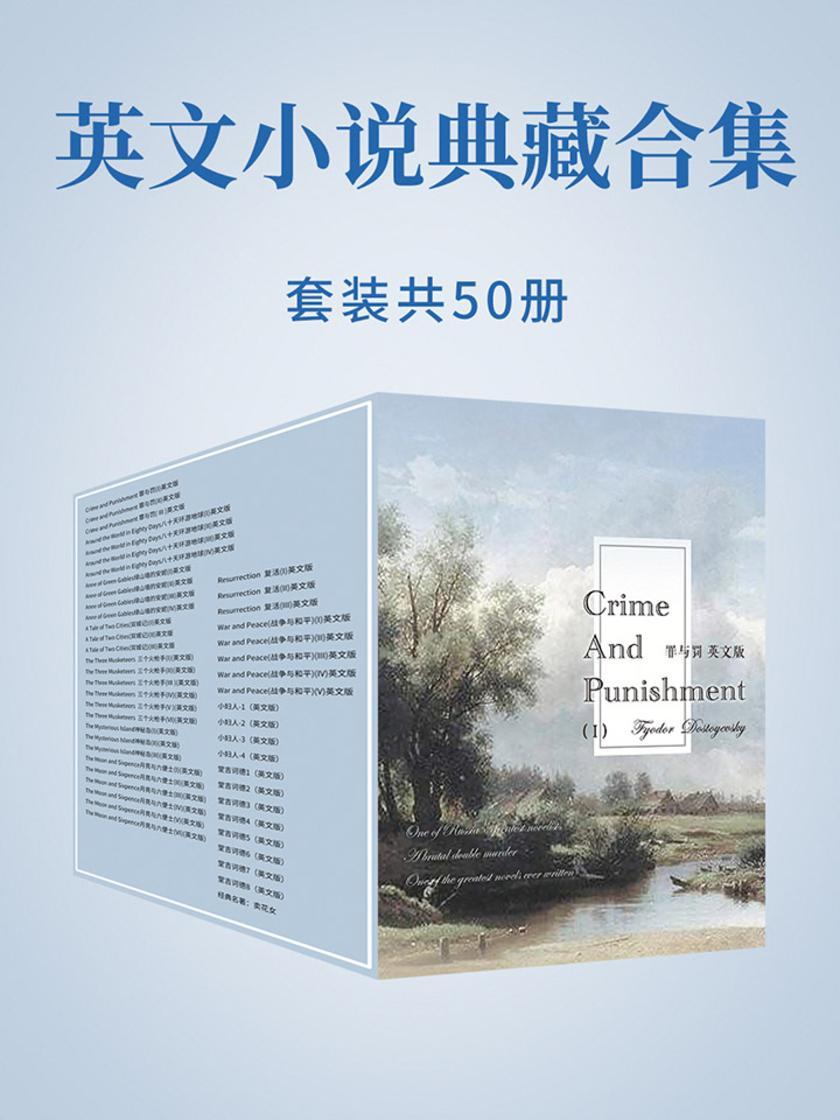
英文小说典藏合集(套装共50册)
¥299.99
本套书包括《罪与罚》《八十天环游地球》《绿山墙的安妮》《双城记》《三个火枪手》等超经典好看的英文版小说共50册。无论是作为英语阅读还是业余消遣,都是值得收藏的好书。 原汁原味的阅读,不仅可以获得原著超赞的阅读体验,也能让自己提升英文阅读能力,是不可错过的经典套装。

知世书坊·一辑(共八本)
¥299.99
随着中国实力的迅速提升,美国长久以来拥有的全球优势地位受到了挑战。从历史的角度来看,《伯罗奔尼撒战争史》中雅典和斯巴达的战争历史,对理解当下中美关系的发展至关重要。修昔底德在书中指出,“使战争不可避免的真正原因是雅典势力的增长以及因此而引起的斯巴达的恐惧”,艾利森将此定义为“修昔底德陷阱”。 本书聚焦崛起中的中国对于美国及全球秩序的影响这一问题,对历史上16个崛起国与守成国行全球竞争的案例和战争场景行分析,指出中美之间的冲突是可以避免的。 作者认为,修昔底德陷阱是一个结构性压力,在现今中国和美国都提出让各自的国家“再次伟大”的时代背景下,两国妥善处理在关键领域的利益分歧,可避免灾难性战争的发生。同时,作者在书中还为中美如何避免发生战争冲突提供了12个具有借鉴意义的方法。

大个子老鼠小个子猫(套装38册):中国版“猫和老鼠”
¥299.99
幽默大师周锐专为小学低年级学生创作的童话,篇幅短小、好玩儿,富有哲理,启迪心智。 大个子老鼠是男生,真诚、友爱,小个子猫是女生,美丽、善良,他们之间发生了许多令人难忘的故事,每个故事都是那么温馨美好,洋溢着友爱的气息。
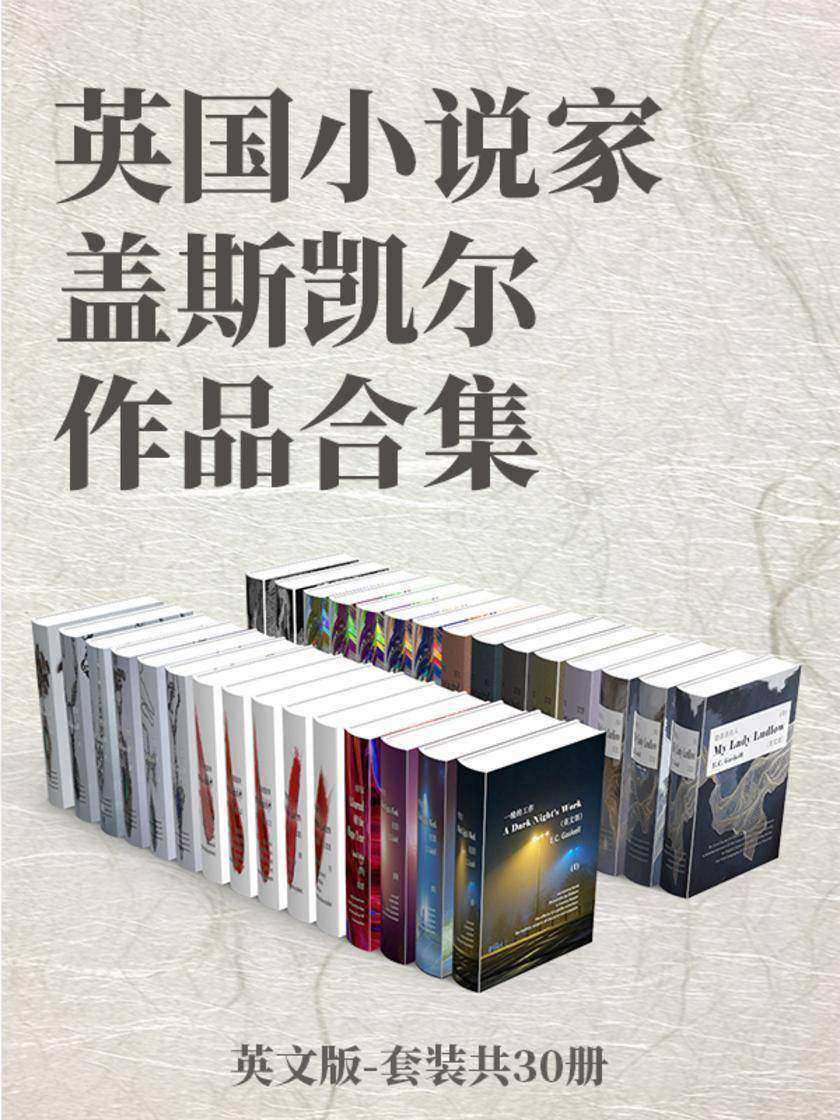
英国小说家盖斯凯尔作品合集(英文版-套装共30册)
¥299.99
本套书包括《一晚的工作)3册》、《 克兰福德3册》、《玛丽:巴顿5册》、《勒德洛夫人3册》、《 北与南5册》、《希尔维亚的情人5册》和《妻子与女儿/锦绣佳人6册》共30册。《一晚的工作》an intense bond /ltered title by Dickens/ a country lawyer/ the effects of a guilty conscious/ the realistic analysis of character and emotion《克兰弗德》immensely popular / a witty portrait of small town life in early-Victorian England /one of the better-known novels of Elizabeth Gaskell/ refined dignity amid poverty《希尔维亚的情人》a saddest story/ during the early phases of the Napoleonic Wars/ the coastal town/ reconciled each other on deathbed

古代世情小说合集:官场现形记+老残游记+二十年目睹之怪现状+孽海花+仙侠五花剑+儿女英雄传+绿野仙踪(套装共30册)
¥299.99
本套书包括《官场现形记》、《老残游记》、《二十年目睹之怪现状》、《孽海花》、《仙侠五花剑》、《儿女英雄传》和《绿野仙踪》,共30册。《官场现形记》,晚清作家李伯元著,是我国部在报刊上连载、直面社会而取得轰动效应的长篇章回小说,也是谴责小说的代表作,首开近代小说批判社会现实的风气。作品以晚清官场为表现对象,集中描写封建社会崩溃时期旧官场的种种腐败、黑暗和丑恶的情形。这里既有军机大臣、总督巡抚、提督道台,也有知县典吏、管带佐杂,他们或龌龊卑鄙或昏聩糊涂或腐败堕落,构成一幅清末官僚的百丑图。《老残游记》小说以一位走方郎中老残的游历为主线,他“摇个串铃”浪迹江湖,以行医糊口,自甘淡泊,不入宦途,他把他所见所闻加以记录,并对当时的社会矛盾深挖掘,尤其是他在书中敢于直斥清官误国,清官害民,独具慧眼地指出清官的昏庸常常比贪官更甚。同时,读者也可看到,即使在这幅刘鹗信手绘出的、风雨飘摇民不聊生的晚清历史画卷上,中国传统文化春风化雨、无处不在、随遇而安,出污泥而不染,化腐朽为神奇。举例来说,玙姑行云流水般的议论娓娓道来,轻而易举地弘扬了儒家文化精华中“攻乎异端,斯害也已”、“发乎情,止乎礼”、及“和而不同”三大精义……等等。《二十年目睹之怪现状》以主人公“九死一生”的经历为干线,从他奔父丧开始,至其经商失败终止,通过这个人物20年间的遭遇和见闻,广泛地揭露了从光绪十年(1884)中法战争前后至光绪三十一年(1905)左右的清末社会的黑暗现实,并从侧面描绘出帝国主义的疯狂侵略。作品写了200来件“怪现状”,勾画出一个到处充斥着“蛇鼠”、“豺虎”、“魑魅”的鬼蜮世界。在清末小说中,它反映的生活面较广,除官场之外,还包括商场、洋场,兼及医卜星相、三教九流,揭露当时的政治状况、社会风尚、道德面貌和世态人情,所以发表时标为“社会小说”。

超好看经典文学(套装共30册)
¥299.99
本套书包括《艽野尘梦》、《诗无邪》、《春秋策:先秦诸子与史记评述》、《泪与笑》、《金陵秋》、《林纾小说集》、《读禅阅世》、《白圭志》、《比目鱼》、《草木春秋演义》、《杜骗新书》、《飞花咏》、《锋剑春秋》、《廿年繁华梦》和《定情人》,共30册。《艽野尘梦》中,作者详细地叙述了自己1909年从军,奉赵尔丰命随川军钟颖总进藏,升任管带(营长),参加工布、波宓 等战役,在驻藏期间同当地藏族同胞、官员和和喇嘛来往密切,同藏族姑娘西原结婚,在1911年10月武昌起义爆发、南北响应的消息传到西藏后,出于对波密起义士兵的一些行动不理解,而又顾念个人安危,于是组织湖南同乡士兵和亲信百五十人取道东归而误入大沙漠,断粮七月余,妨饥挨饿,茹毛饮血,仅七人生还于西安,西原病卒,等经历、描绘了沿途所见的山川景色、人情风俗和社会生活、同时记录了英、俄帝国主义觊觎和争夺我国神圣领土西藏的罪恶和阴谋活动,清政府的举国腐败,清封疆大吏之间和军队内争权夺利、勾心斗角等、记载耻辛亥革命对西藏和川军的重大影响和军中的同盟会员、哥老会 成员在波客乘机发动兵变、杀死协统罗长婍的实况。《林纾小说集》收录了林纾《技击余闻》与《京华碧血录》两篇小说。《技击余闻》记述闽中拳师轶闻琐事的笔记小说。作者自幼娴习拳击剑术,所以写得颇有神采。《京华碧血录》一书,在近代反映庚子事变的小说中,思想内容是比较进步的。作品在写作技巧上,完全摆脱了章回小说传统,而学习外国小说的表达技巧,只分章,而无回目。在叙述、结构上均具现代色彩,惟语言仍具古文风范。

“狼牙少帅”刘猛军事小说集(套装共15册)
¥299.99
“狼牙少帅”刘猛经典军事文学作品全收录,千万读者心中无法超越的军事经典,真实演绎特种兵的铁血生涯,热血见证中国特种兵的信仰与忠诚。中国军魂,永不言败!

民国大师周作人自编全集(套装三十八册)
¥299.99
周作人(1885年1月16日~1967年5月6日),浙江绍兴人。是鲁迅(周树人)之弟,周建人之兄。 中国现代著名散文家、文学理论家、评论家、诗人、翻译家、思想家,中国民俗学开拓人,新文化运动的杰出代表。 历任国立北京大学教授、东方文学系主任,燕京大学新文学系主任、客座教授。 周作一生著作颇丰,他的散文风格平和冲淡,清隽幽雅,以温和、冲淡之笔书写个人的闲适、寂寞与不平,把玩人生的苦趣,著有《艺术与生活》《自己的园地》《雨天的书》《知堂文集》《秉烛谈》等三十余种。周作人在译作方面也有卓越贡献,他精通日语、古希腊语、英语,并曾自学古英语、世界语,翻译包括古希腊喜剧《财神》、《希腊神话》、《伊索寓言》全译本、古希腊悲剧《欧里庇得斯悲剧集》;日本现存*古的史书《古事记》、滑稽短剧《狂言选》、平安时代随笔代表作《枕草子》、滑稽本《浮世澡堂》等。 本套丛书辑录周作人自编作品,包括《艺术与生活》《自己的园地》《雨天的书》《知堂文集》《秉烛谈》等,共计三十八册。

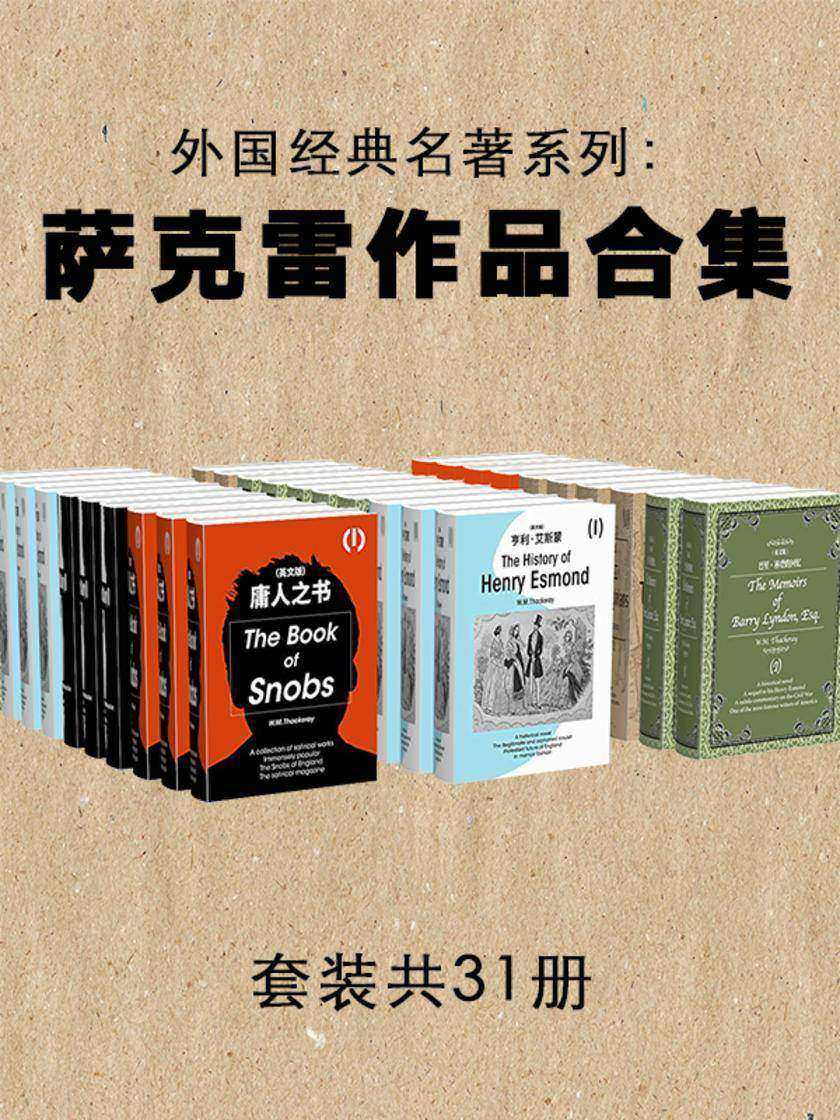
外国经典名著系列:萨克雷作品合集(套装共31册)
¥299.99
本套书包括《Catherine A Story 凯瑟琳(英文版)》、《The Book of Snobs 庸人之书(英文版)》、《The History of Henry Esmond 亨利·艾斯蒙(英文版)》、《The History of Pendennis 潘丹尼斯(英文版)》、《The Memoirs of Barry Lyndon, Esq. 巴里·林登的回忆(英文版)》和《The Virginians 弗吉尼亚人(英文版)》,共31册。《Catherine A Story 凯瑟琳(英文版)》This work first appeared in serialized installments in Fraser's Magazine between May 1839 and February 1840. Thackeray's original intention in writing it was to criticize the Newgate school of crime fiction, exemplified by Bulwer-Lytton and Harrison Ainsworth, whose works Thackeray felt glorified criminals. Thackeray even included Dickens in this criticism for his portrayal of the good-hearted streetwalker Nancy and the charming pickpocket, the Artful Dodger, in Oliver Twist. Thackeray felt the result was a failure, and did not republish it in his lifetime. Ainsworth's Jack Sheppard portrayed a real life prison breaker and thief from the eighteenth century in flattering terms. In contrast, Thackeray sought out a real life criminal whom he could portray in as unflattering terms as possible. He settled on Catherine Hayes, another eighteenth-century criminal, who was burned at the stake for murdering her husband in 1726. However, as he told his mother, Thackeray developed a "sneaking kindness" for his heroine,[3] and the novel that was supposed to present criminals as totally vile, without any redeeming characteristics, instead made Catherine and her roguish companions seem rather appealing. 《The Virginians 弗吉尼亚人(英文版)》The Virginians is a novel by William Makepeace Thackeray which forms a sequel to his Henry Esmond. Set partly in England and partly in colonial Virginia,It tells the story of Henry Esmond's twin grandsons, George and Henry Warrington. The novel follows the trials and tribulations of the twin brothers whose personal lives intrude on their decision to fight in the war effort. Henry's romantic entanglements with an older woman lead to his taking a commission in the British army and fighting under the command of General Wolfe at the capture of Quebec. On the outbreak of the American War of Independence he takes the revolutionary side. George, who is also a British officer, thereupon resigns his commission rather than take up arms against his brother. Later two brothers find themselves on opposite sides of the war for American Independence. The breach between them is followed as the brothers take opposite sides in the American Civil War. A subtle commentary on the Civil War and the breach between the two sides is also presented.

鸳鸯蝴蝶礼拜六派经典小说文库(全8册)
¥299.99
帮会名家:姚民哀代表作,姚民哀作为“会党武侠小说”的专家,成功地将武侠与会党组织结合起来,既有纪实性的资料价值,开拓了武侠小说的描写空间。 滑稽大师:徐卓呆代表作,有“三栖笑星”之称,于现代滑稽小说领域中独领风骚的文豪——徐卓呆,其人生活经历丰富多样,不仅是位能编能演的剧作家、演员,更是位滑稽小说的创作能手,在其机智巧思和天马行空的笔下,写出滑稽小说崭新的艺术风貌。 人情才子:毕倚虹代表作,鸳鸯蝴蝶派重要一员毕倚虹经典代表作。 幽默笑匠:程瞻庐代表作,程瞻庐熟悉十里洋场生活,戏院、茶馆、酒肆等是他常去之处,三教九流亦多有接触,即便遇到泼妇骂街,他也照样耐着性子驻足而听,从中撷取小说材料。因而他的笔下刻画人世百态惟妙惟肖,被周瘦鹃推崇为“今之淳于髡东方朔”。 倡门画师:何海鸣代表作,倡门小说实际上跟鲁迅笔下的“狭邪小说”异曲同工。都是通过妓院这个人间悲喜剧的集合地,要么控诉旧社会,要么以此批判和揭露人性。尽管笔端多有淫秽之处,今人看来多半会扣一个“黄色小说”的帽子,但实际上“骨子里是很纯正的小说”。由此,何海鸣获得一个“倡门画师”的美名。 哀情巨子:周瘦娟代表作,周瘦鹃,民初通俗文学界中一位编辑、翻译、创作皆能的文坛风云人物。文如其人,不论是身世和文风皆充满了哀怨凄楚的况味,是民初创作哀情小说的大师级人物。 侠盗文怪:孙了红代表作,孙了红是中国现代通俗侦探推理文学发展史上的重要人物。 武侠鼻祖:向恺然代表作,即平江不肖生作品集,包括《江湖奇侠传》《近代侠义英雄传》

就是要看:人人都爱看的古代经典小说全集(套装共33册)
¥299.99
"本套书主要包括《梼杌萃编》《归莲梦》《画图缘》《白圭志》《三宝太监西洋记》《绣云阁》等共计33册。 《梼杌萃编》讲述一幕幕真实鲜活的丑剧,极为深刻地揭示出晚清官场的肮脏污浊、奸诈贪婪和冷酷虚伪。 《归莲梦》虽然写的是白莲教起义,但实际上是一部才子佳人和历史、神怪混合在一起的产物。书中以女主人公白莲岸的曲折经历为线索,反映了延续元、明、清三代的白莲教起义的历史事件。 《画图缘》叙述男主角花天荷得异人指点应诏平蛮并与女主角柳蓝玉成亲的故事。才子佳人小说发展到了这一步,在打破模式、有所创新方面有作者努力的痕迹。 并且,将传奇与战争杂糅进闺阁小说中,使其在情意绵绵中体现出玄幻和世情色彩。 《白圭志》描写才女杨菊英与才子张庭瑞私订终身,遭到父亲的极力反对。在万般无奈之中,她想到的是投井自尽。“身为女子,志胜男儿”,才子佳人中,气概与气节,也是作者津津乐道的精神特质之一。 善善恶恶,因果报应,在劝喻世人向善的道理之外还讲述了一个有头有尾的爱情故事,读者大可各取所需。 这些故事好看有趣,适合消遣阅读,值得收藏。"

休闲书系:有趣的古代小说(套装共30册)
¥299.99
本套书包括《比目鱼》《醋葫芦》《于公案》《八贤传》等经典古代小说共30册。这些经典故事内容丰富,情节生动曲折,数百年来被人所津津乐道。其中有关于爱情、友情以及人情世故种种,不仅是消遣阅读的***,更是增长人生智慧的宝典。跟古人学处事,行走于当代社会,可谓获益颇多。

一套书提升逼格(文史哲+经管互联网)(套装共40册)
¥299.99
《一套书提升逼格(文史哲+经管互联网)(套装共40册)》,套装分别包含: 《自我提升读物:那些启迪牛津的成功故事:英汉对照》 《自我提升读物:那些感动哈佛的励志故事 汉英对照》 《重口味心理学》 《重口味经济学》 《中庸:平民处世哲学》 《中华句典(Ⅱ)》 《中国学术之趋势》 《中国文化常识全知道》 《中国通史:双色典藏版》 《哲思录》 《一学就会的超级记忆术》 《一口气读完欧洲史》 《一口气读完美国史》 《一本书读懂互联网思维》 《一本书读懂大数据》 《销售中的心理学》 《西方哲学史》 《西方哲学史-英文版》 《文学理论经典:文心雕龙》 《文学经典名家系列2》 《文学经典名家系列1》 《文坛掌故全书》 《文化常识全典》 《晚清那些事儿》 《跟青年谈鲁迅》 《给日本的遗书》 《时尚休闲读物:老外想和你聊的101个英语话题·流行名人篇》 《人生哲理漫画书》 《达·芬奇手记:珍藏版》 《船山思问录》 《传习录》 《读史记学做人》 《读格言,练英语:每天一句英语格言-人生哲理篇》 《读格言,练英语:每天一句英语格言-健康幸福篇》 《行为改变思想:表现原理》 《满清兴亡史》 《满清外史》 《美国宪法的经济解释(美国史学史上一部划时代的著作)》 《美学讲义(下)》 《美学讲义(上)》 内容涉及文史哲以及经管类图书。读了本套书,可以极大增加读者的谈资,上至天文地理,下到职场家常,都能让你侃侃而谈,是提升逼格不可不看的超值书。 本套书适应的读者群较广,存上一套无事时随便翻上几页,就能让自己在不知不觉中受益匪浅。

明清小说典藏书系(套装共90册)
¥299.99
明清小说典藏书系(套装共90册)包含:清代小说·说岳全传、清代小说·济公全传、清代小说:大清三杰、清代武侠公案小说·郭公案、清代世情小说·闪电窗、清代经典长篇小说:荡寇志、清代经典文学:仙侠五花剑、清代经典文学:孽海花、清代经典文学:绿野仙踪、清代经典文学:老残游记、清代经典文学:官场现形记、清代经典文学:二十年目睹之怪现状、清代经典文学:儿女英雄传、清代短篇小说集·子不语、清初历史演义小说·三国演义毛评本、明清小说淞隐漫录、明清小说·观音菩萨传奇、明清古典小说:合锦回文传、明代长篇小说:禅真后史、明代小说·萨真人得道咒枣记、明代小说·花影集、明代小说·飞剑记明代小说·洞冥记、明代小品文集·呻吟语、明代武侠历史小说:禅真逸史以及明代神魔小说·后西游记。

民国大师周作人自编全集(套装三十八册)
¥299.99
本套丛书辑录周作人自编作品,包括《艺术与生活》《自己的园地》《雨天的书》《知堂文集》《秉烛谈》等,共计三十八册。 《民国大师周作人作品全集》各册作品目录如下: 自己的园地 周作人书信集 中国新文学的源流 知堂乙酉文编 知堂文集 知堂回想录(上) 知堂回想录(下) 泽泻集 雨天的书 永日集 艺术与生活 夜读抄 药味集 药堂杂文 药堂语录 谈龙集 谈虎集 书房一角 欧洲文学史 木片集 鲁迅小说里的人物 鲁迅的青年时代 鲁迅的故家 立春以前 老虎桥杂诗 苦竹杂记 苦雨斋序跋文 苦口甘口 苦茶随笔 看云集 近代欧洲文学史 过去的生命 过去的工作 瓜豆集 风雨谈 儿童文学小论 秉烛谈 秉烛后谈
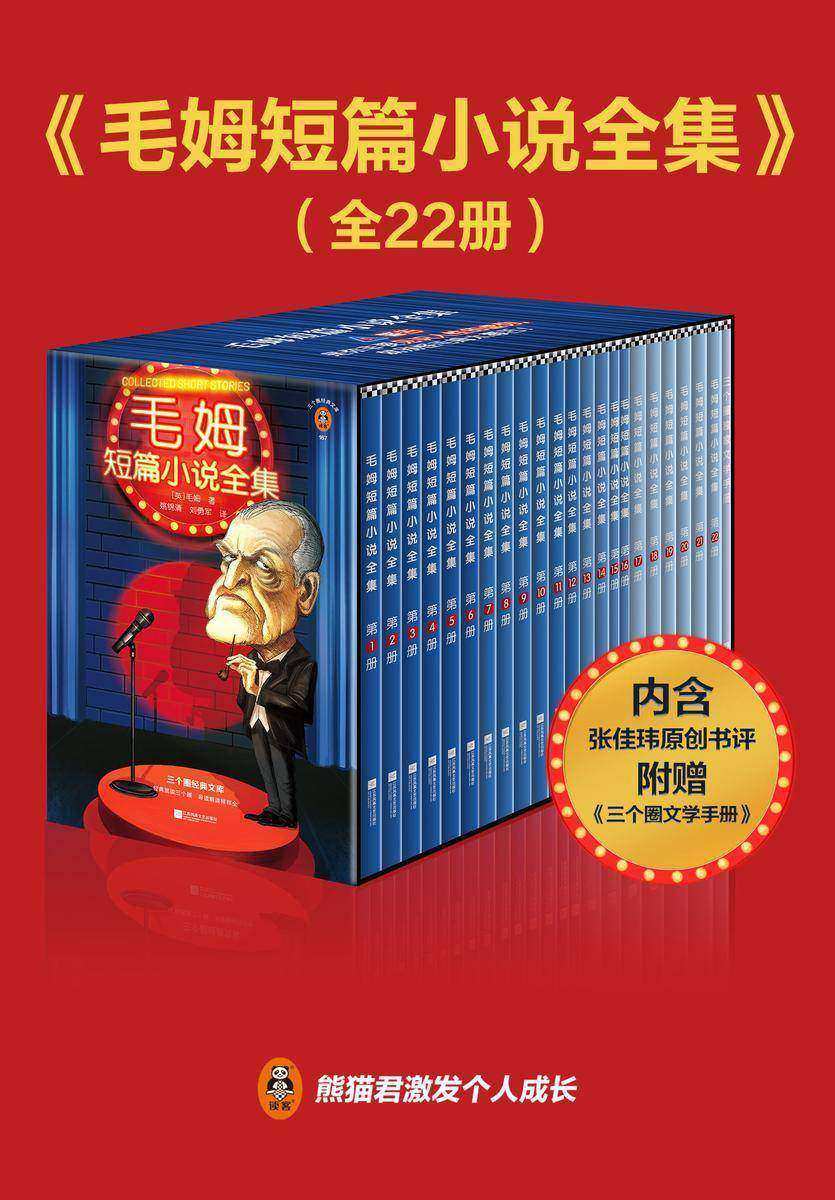
毛姆短篇小说全集(全22册|读客三个圈经典文库)
¥299.90
揭开人性虚伪的面纱,就读这套《毛姆短篇小说全集》! 国内首套口袋本《毛姆短篇小说全集》!毛姆真正的天赋,都在他的短篇小说里! 篇篇有反转,处处是金句,带你看透人性的虚伪! 毛姆的毒舌,体现在他对人性虚伪的深刻揭露 一篇篇短小精悍的故事背后都是超辛辣的讽刺! 他谈论人性、爱情、命运、背叛这些永远不会过时的主题, 轻描淡写地讽刺,洞察人性的真相,戳破虚伪的面纱!

诸葛亮正传(真实的诸葛亮比《三国演义》中的更厉害!马伯庸作序推荐。十年之后全新修订、套装收藏版!)(读客中国史入门文库)
¥299.90
从初通谋略、耕读襄阳,到出师北伐、鞠躬尽瘁,一本书详尽讲述诸葛亮五十四年的壮阔生涯。还原被渲染、神化背后的真实历史,看到一个有血有肉、有喜怒爱憎的诸葛亮,看到诸葛亮作为军事家、政治家、文学家、外交家、书法家的复杂形象。

终极教师
¥299.90
【都市爽文+高能反转+笑点暴击】男频都市大神柳下挥必看经典之作! 方炎乃太极世家传人,为了躲开凶悍的未婚妻,跑路到朱雀中学当语文老师。 怎奈他不仅武功高强,还精通国学,剑术、书法、茶道样样拿手,带领全班在比赛中一路逆袭,成了学校风云人物!后来更是一战封神,在一剑峰上击败日本剑神,勇闯军火库救校花,智斗黑帮解救被绑架的美女校长…… 而他的开挂人生,才刚刚开始!
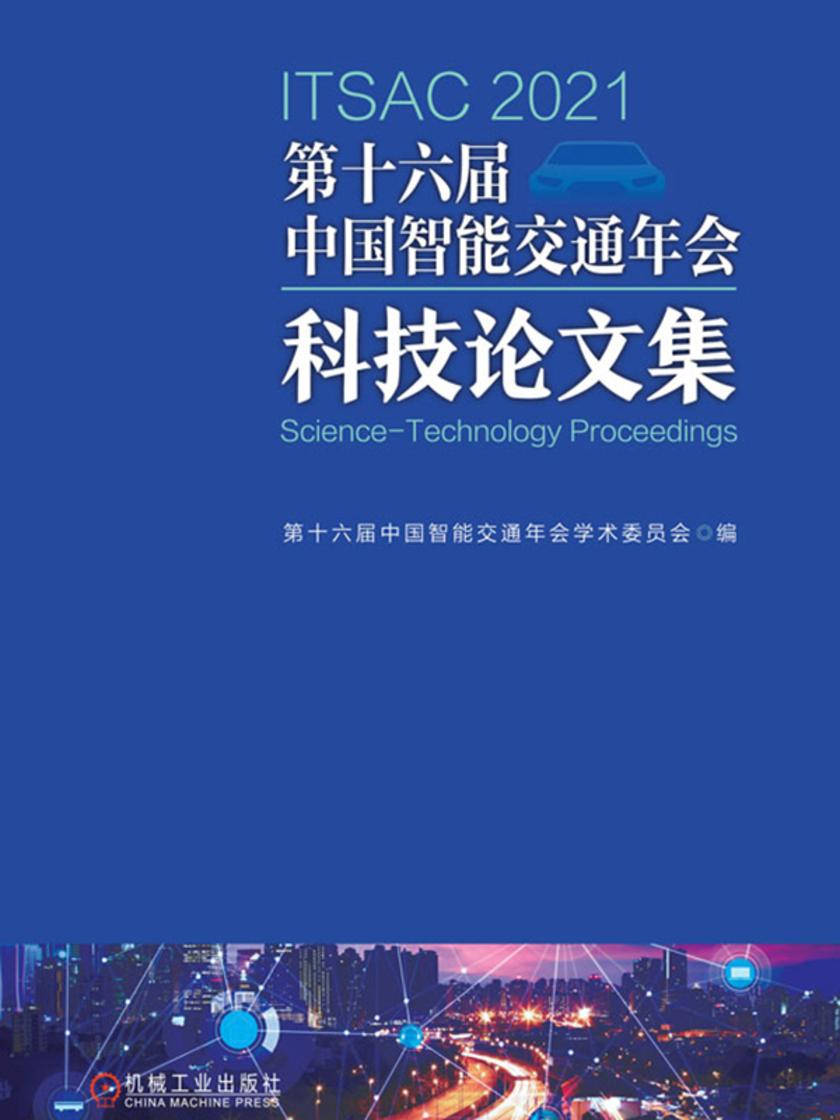
第十六届中国智能交通年会科技论文集
¥299.90
《第十六届中国智能交通年会科技论文集》收录了60篇在第十六届中国智能交通年会中提交的科技论文,内容涵盖国内外城市交通、轨道交通、高速公路、自动驾驶、民航等不同智能交通领域,主要针对智能交通的发展政策、智能交通技术、智能交通应用、智能交通的成果及转化,以及智能交通领域新的热研究,具有很高的参考价值。

火爆天王:从监狱走出来的天王巨星
¥299.90
男频都市大神柳下挥必看经典之作!狱中走出来的妖孽少年,代替自己病重的妹妹加入一个偶像组合。 于是,娱乐圈的火爆天王就此诞生。 背负“天王”身份的大学生游走在菁菁校园,引发了一系列有趣的故事…… 在校园、娱乐圈和家族斗争中,唐重一步步成长,解开了重重身世之谜,与多方势力纠葛。 他打败一个又一个敌人,收获一个又一个朋友,创造一个又一个奇迹,走向人生的*! 翻开本书,看监狱妖孽少年到娱乐圈天王巨星的逆袭之路!


阿德勒基础心理学读本(套装15册)
促销价:¥9.99|¥299.85
《阿德勒基础心理学读本(套装15册)》是一套全面解读阿德勒心理学思想的经典合集。书中收录了《阿德勒对梦的解析》《阿德勒谈婚姻与爱情》《阿德勒谈家庭对个人的影响》等著作,深入剖析了梦境、婚姻、家庭、学校教育、职业选择与人际交往等对个人心理成长的影响。 作品从现代视角探讨自律与青少年成长,也引导读者探索生命价值、克服自卑、理解儿童心理发展。 这套书以通俗易懂的语言,结合丰富的实例,为心理学爱好者及关注个人成长的人士提供了宝贵的理论指导与实践建议,是了解阿德勒心理学的绝佳入门读物。




 购物车
购物车 个人中心
个人中心



